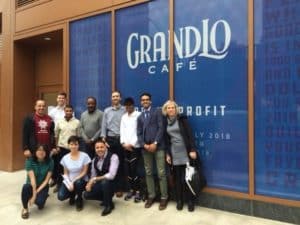Grand St. Settlement is a social services organization in New York that focuses on empowerment, support, and advocacy. In operation since 1916, Grand St. serves thousands of New Yorkers through child and family centers, education, and skills-based programs.
In November 2017, Grand St. Settlement announced a bold — and tasty — new venture: GrandLo Café. The organization launched a Kickstarter campaign, and nearly $7K was raised in its first week of fundraising.

“GrandLo Café will offer a high-quality café experience, while also providing job training to disconnected – out of school or out of work—youth,” says the Kickstarter page. “When disconnected youth are not highly engaged in effective training and education, they face obstacles such as criminal involvement, gang violence, and barriers to educational achievement.”
The initiative aims to raise funds to provide job training (barista, food prep, café management) as well as life skills training groups and one-on-one sessions for 60 youth.
“The cost to incarcerate a person at NYC’s Rikers Island for one month is $17,417, while our program is a fraction of a cost to taxpayers,” the Kickstarter page points out.
Not only can programs like this help at-risk youth, but they can also provide valuable job training and skills for newly released young offenders. Grand St. Settlement’s project will have immediate and lasting benefits for the youth that complete the program, provided the Kickstarter reaches its goal, and enough funds come through. Those 60 youths will launch the café, which can become self-supporting and continue to help other at-risk youth. Those that complete the program will attain confidence and skills likely to reduce their risks of living in poverty and resorting to crime.
As fantastic as this initiative is, the need for it also points to a bitter brew. The idea of GrandLo Café in and of itself is a positive and meaningful one, and while people in the U.S. and Canada are stepping up to support its efforts, it’s hard to ignore the fact that Americans increasingly must turn to self-started programs such as this to help those in need. It points to an overarching lack of government support for those at risk and for those at risk of reoffending.
The United States locks up more youth than any other country in the world – and the numbers are not because of its large population. Both China and India far outstrip America when it comes to the number of citizens. So why is the juvenile detention rate so high here in the US?
About 40 percent of incarcerated youth are in privatized, for-profit facilities. Even more telling is this fact: when the War on Drugs was declared, the overall incarceration rate increased dramatically — from 40,900 in 1980 to 469,545 in 2015, across all age groups. Black men and women are imprisoned at a rate of 1 in 3 for men, and 1 in 18 for women (as opposed to 1 in 17 for white men and 1 in 111 for white women), and the rate of incarceration for Latina men and women isn’t much better.
What we have in the U.S. is a lopsided, racially charged, for-profit system that is keeping our jails full, pushing at-risk youth closer to prison, and cutting their chances of successful reintegration when they come out.
It’s important to support programs such as GrandLo Café. Programs that aim at helping and reforming at-risk youth can help make a dent in the scary statistics. The people behind the program are visionaries, and the program’s backers are good citizens making meaningful contributions toward change. But at the same time, we must continue to pressure the government to reform our system of mass incarceration.
Christopher Zoukis is the author of Federal Prison Handbook: The Definitive Guide to Surviving the Federal Bureau of Prisons, College for Convicts: The Case for Higher Education in American Prisons (McFarland & Co., 2014), and Prison Education Guide (Prison Legal News Publishing, 2016). He can be found online at FederalCriminalDefenseAttorney.com.
Published Dec 28, 2017 by Christopher Zoukis, JD, MBA | Last Updated by Christopher Zoukis, JD, MBA on May 7, 2025 at 5:06 pm
